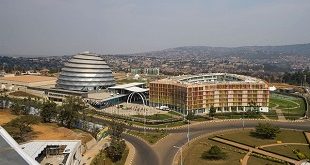
By Julius Odeke
Some political analysts and academics have said since the February 2011 post-election economic meltdown and crackdown on the opposition, Uganda has degenerated into a failed state. The Independent’s Julius Odeke interviewed Moses Byaruhanga, a political commentator and a political advisor to President Yoweri Museveni on whether Uganda is a failed state?
Makerere law don, Prof. Frederick Jjuko says Uganda is a failed state. Is he right?
Prof Jjuko’s pronouncement helps us as government to know where people think that the National Resistance Movement has gone wrong. If that comment had come up in 1980s, it would be okay because President Yoweri Museveni was just coming into power and all the arms of government were not functioning, but today you cannot refer Uganda as a failed state. Uganda today is a democratic country; we have elected members of parliament, LCs, and the president. After every five years we carry election process which is always declared by the European Union, Commonwealth observers as free and fair. In such a country, with all those democratic processes exercised, you cannot have the audacity to call Uganda a failed state.
In your own words what do you understand by the phrase a ‘failed state’?
A failed state is a state that has failed to govern some parts of her territorial borders. So, when you look at Uganda, we have managed to control all our borders and also to send some a contingent of the army to keep peace in Somalia, and in Central Africa Republic hunting Lord’s Resistance Army warlord, Joseph Kony. That alone means we are not a failed state.
In Africa, which countries can you name as examples of failed state, if Uganda is not among them?

Sometime back Somalia had no government in operation. At that time it qualified to be a failed state, but today there is an elected president who has been installed and also the security organs in Somalia together with the AMISOM forces that have been provided by Uganda, Burundi, and Kenya have managed to bring sanity to Somalia. It has ceased being a failed state.
Last year we saw security operatives beat, harass, shoot at and kill innocent civilians, when they were simply exercising their right of having demonstrations against the government, does such act tantamount into Uganda being referred to as a failed state?
No. Deploying the army is a right of every government, but there instructions that are given to soldiers on duty. Government does not order them to kill or even shoot at demonstrators. At times there are tendencies that force our army to behave like that, which people have failed to know. And also those who behave in a manner against human rights are prosecuted. Uganda’s judicial system is effectively enforced to ensure that wrong elements in the force are brought to book.
Really?
Yes, we have so many of such characters who have been brought to book and they are answering for their wrong doings.
When you look at the economy of Uganda and you compare it with those failed states there is no difference. What is your comment on that?
Our economy is picking up. Remember there has been economic meltdown that affected the global economy and Uganda was no exception to that because even America; the number one economy was not spared. But our government, through the good leadership of President Museveni, has opened her doors to foreign investors and the economy will improve.
One of the indicators of a failed state is corruption, and when look at Uganda today there widespread corruption.
Even the President admits that there is corruption in our country among some individuals and he is fighting it seriously. That is why you can see very many public servants are being investigated and some go to prisons because they tamper with public resources. The government is not just watching those corrupt people. It has ensured that corruption will be stamped off in this country.
The gap between the rich and the poor is alarming as the rich continue being rich while the poor also continue wallowing in abject poverty. What does that indicate about the country?
You cannot stop people from being rich. And that is why individuals like the proprietors of The Independent Magazine are rich, those are private individuals who have opened up their businesses and you cannot as government stop them from getting rich. If you did, it would be unfair to those who work. The point is if you are a hardworking person you get rich, and if you are lazy you will remain poor.
People have demanded for Federo and for long government has refused grant them the system of governance that they want to be governed with, why?
On the issue of Federo, the NRM government has discussed this several times, and in our Constitution, Article 128, districts that want to federate are free to do that. They come and apply for their federation.No districts have come to do that. Should the government force them to do what they don’t want? However, Uganda as a country is aiming at the East African Community, which is a federation of five countries that include; Uganda, Kenya, Tanzania, Burundi, and Rwanda. These countries are aiming at creating a big market and gain more recognition from the international community and attract more foreign investment.
We have seen government operatives intimidate and beats journalists, closes media houses like KFM, The Monitor Publication, and CBS to mention but a few. Why is government suppressing the media?
The government that I serve is not in any way suppressing the media.
The media today in Uganda is very vibrant, many radio stations are on air, many newspapers like The Independent, The Daily Monitor name them are in operation and nobody has stopped them from executing their work. Uganda remains a media friendly country, because we believe in freedom of expression and of press.
 The Independent Uganda: You get the Truth we Pay the Price
The Independent Uganda: You get the Truth we Pay the Price



